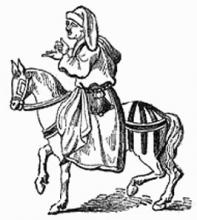In light of current events around the world, it might be a good idea to look at the story of John Ball, the radical priest who was one of the leaders of the peasant rebellion of 1381. When I say “radical priest,” I don't mean that any of his ideas were all that extreme, but they did appear that way to the rulers of England. In the words of John Ball himself:
“When Adam delved and Eve span, who was then the gentleman? From the beginning all men by nature were created alike, and our bondage or servitude came in by the unjust oppression of naughty men. For if God would have had any bondmen from the beginning, he would have appointed who should be bond, and who free. And therefore I exhort you to consider that now the time is come, appointed to us by God, in which ye may (if ye will) cast off the yoke of bondage, and recover liberty.”
The phrase “When Adam delved and Eve span, who was then the gentleman?” became a rallying cry for peasant rebellions across medieval Europe, as men and women who had never tasted liberty decided to take up arms and fight for their rights. The main goal of the 1381 rebellion was for serfdom to be abolished, a decidedly modest and reasonable goal for people who had suffered so much. The rebel leader Wat Tyler was killed during negotiations, the rebellion was crushed, and John Ball was hung by the authorities.
Even though the rebel peasants did not achieve their goal, historians believe that the example of the peasant rebellion did lead to the eventual emancipation of the serfs. At the height of the uprising, the peasants succeeded in storming the Tower of London and executing some of England's most powerful noblemen. The specter of what the peasants could do when they were really angry terrified the ruling classes, and convinced them that if revolution was to be avoided, reform was inevitable. Serfdom faded away in England over the next century, so even if the peasants didn't win the war, they did succeed in improving the lives of England's lower classes over time.
